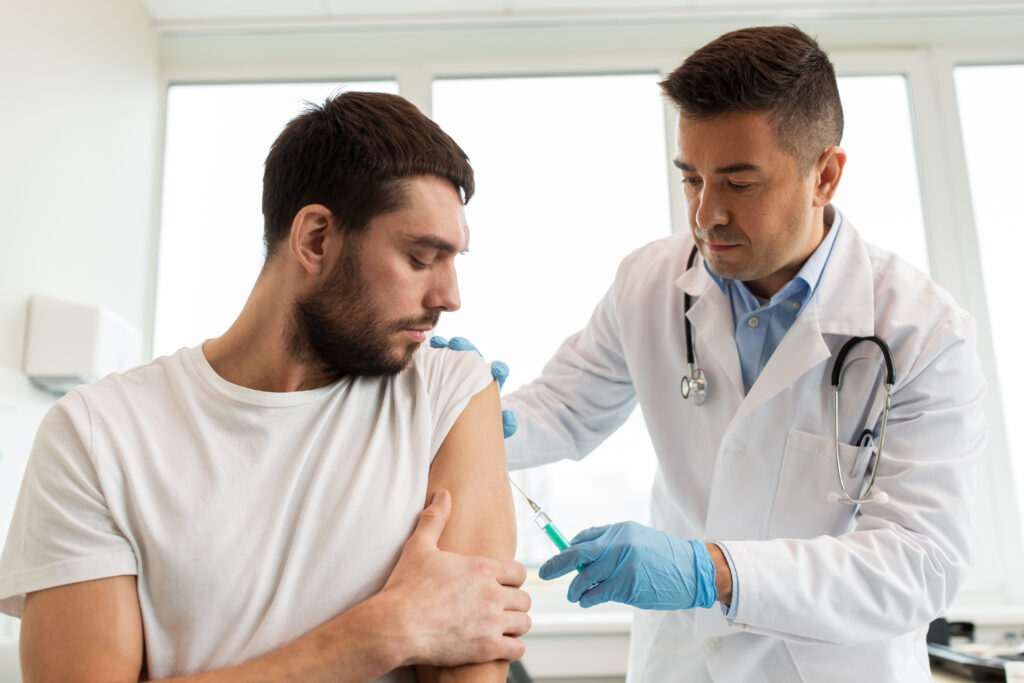
Penile and Testicular Cancer Warning Signs & Prevention
Dr. George is back to review testicular and penile cancer warning signs and prevention methods.
Last I spoke to Dr. George we went over hygiene tips for uncut men because a clean penis is a healthy penis, as the old saying goes. Keeping our focus on genital health, I asked George to also go over testicular and penile cancer warning signs with me so we can all be on the lookout. As is the case with many cancers, early detection is the key to curing it.
Testicular cancer is most common in people between the ages of 15 and 35. According to the American Cancer Society about 1 of every 250 males will develop testicular cancer at some point during their lifetime. This rate increases to 1 out of every 100 males in Australia, where Dr George practices, according to Australia’s Health Direct website.
Dr. George reiterates that early detection is key and that just because you are over 35 you should not lose vigilance against testicular cancer. He says we should be looking out for pain and lumps in the testicle. The best time to self-examine for lumps is in a warm shower where all the muscles in the scrotum are relaxed and you can get good palpation. If you are not accustomed to doing these checks already then start immediately so that you can learn what your testicles feel like normally and you can be aware as soon as a change in them occurs.

“When you’re in the shower hold one testicle in your hand, in between your thumb and your first two fingers. And then you’re just going to gently rub your thumb over the testicles at the front and then do the same for the back. Each testicle should be somewhere between the size of a large olive to maybe a walnut. The testicle should be smooth. If there are any rough patches, that’s something that should be checked out by your doctor.”
You will also notice that there’s a strip at the back of each testicle which is completely normal. That’s where the blood vessels go in and out of the testicle and also where the semen is transported out of the testicle. Any lumps beyond that should be examined by your doctor.
The key signs of testicular changes are pain in the testicle, a new lump on the testicle, or a sensation that the testicle is dragging, like it is stuck somewhere inside the scrotum. Look out for things like blood in the semen too. There are many things that can cause blood in semen, from gonorrhea, to a urinary tract infection, to a prostate infection; but changes in the testicles can also cause this, so it’s a potential warning sign of cancer as well. If you notice this, go and see your doctor.
If you visit your doctor for a testicular cancer screening, they would most likely order blood tests to check for tumor markers and get an ultrasound on your testes. Depending on the results, your primary care physician might organize for you to go and see a urologist where they can discuss your symptoms further and complete additional testing if necessary.
In addition to testicular cancer, we should also be on the lookout for penile cancer which will be obvious and noticeable by a very visible lump on the penis. Most penile cancers have a common root cause but, there are ways we can combat it according to George:
“Most of the penile cancers, well most genital cancers really, are caused by HPV, the Human Papilloma Virus, which you can vaccinate yourself against. There’s a vaccine called Gardasil 9, which is absolutely worth considering because men who have sex with men are at 40 times the risk of developing genital cancers, particularly anal cancers. And if the person is HIV positive, that increases up to 100 times the risk. Talk with your doctor about getting vaccinated.”

Further to this, Dr George advises that those with genital warts should also go get treated immediately. Genital warts is caused by the Human Papilloma Virus. Patients are advised not to live in shame or be crushed by the stigma since it is so easily treated and will help prevent the chances of cancer in the genital region later in life. Its also important to note that HPV is the most common of all STI’s and chances are that if you are sexually active, you’ve already been exposed; but that doesn’t mean you shouldn’t get the Gardasil vaccine. In fact, quite the opposite.
“It’s interesting with the HPV vaccine. A lot of the doctors said if you’re over the age of 21 or 24, depending on what state you’re in, there’s no point in getting it done because you’ve probably already been exposed to HPV, which is true. You probably have been. However, there are hundreds of strains of HPV and some really nasty strains, like 16 and 18 which cause cancer. There was a study done in Sydney, the SPANC study, that looked at this and they basically found out that even people all the way up to the age of 70 have probably been exposed to one or two of the human papilloma viruses, but not all of them. Gardasil 9 covers nine of the strains, five of the nasties, two of the annoying ones. What they’ve said is that even up to the age of 70, if you are sexually active, it is still worthwhile getting that vaccine. It will still offer you some protection, so it’s still worth it.”
And there you have it gentlemen. If you have not been vaccinated for HPV yet, now’s the time.
With regard to other forms of genital cancer, Dr. George warns against melanoma for nude sunbathers. Penile and scrotal skin is not often exposed to the sun so when someone repeatedly does expose that more sensitive skin to the sunlight, damage can more easily and readily occur. And while this isn’t one of the more pressing forms of genital cancer, it’s a simple matter of vigilance against any changes in the skin.

Dr. George Forgan- Smith is an expert in gay men’s health dedicated to the bear, leather and kink communities which he serves faithfully in Melbourne, Australia. In addition to working at the Collins Street Medical Centre and creating tons of educational content for his social media accounts (links below), he is the creator of The Healthy Bear website which he uses to share vital health information pertaining to and about our community.
Stay in touch with Dr George and up to date on the latest in gay men’s health by signing up to his mailing list HERE.
Follow Dr. George on social media: Twitter I Instagram I YouTube
***Disclaimer: You must not rely on the information on this website as an alternative to medical advice from your doctor or other professional healthcare provider. If you have any specific questions about any medical matter you should consult your doctor or other professional healthcare provider. If you think you may be suffering from any medical condition you should seek immediate medical attention. You should never delay seeking medical advice, disregard medical advice, or discontinue medical treatment because of information on this website.











